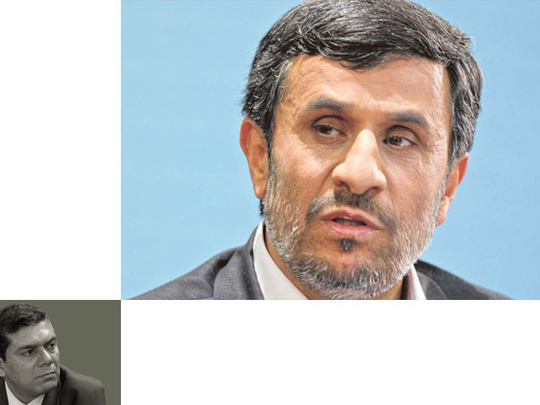
In the race between Turkey and Iran to expand regional influence and boost international stature, the latter is edging ahead. One of the reasons is Syria. Turkey’s President Recep Tayyip Erdogan, once a close friend of Syrian President Bashar Al Assad, spearheaded an international campaign to unseat him.
Ankara joined a loose anti-Al Assad coalition that comprises Qatar, Saudi Arabia, Britain, France and the US. Erdogan even invited the Syrian opposition to reside in Turkey and hosted the first batches of defecting soldiers and officers who later became the nucleus of the Free Syrian Army. Most weapons and munitions travel through the porous Turkish-Syrian borders to rebels fighting the Damascus regime.
In the early days of the two-year Syrian uprising, Turkish Foreign Minister Ahmet Davutoglu intervened with the regime and tried to convince Al Assad to adopt political reforms and to negotiate with the opposition. But he failed and Ankara became a major backer of the Sunni rebels and the political opposition in exile.
Soon after Erdogan began calling for Al Assad’s ouster. Since then Turkey’s connection to the Syrian regime has been terminated.
On more than one occasion, Erdogan and Davutoglu said that Al Assad’s days were numbered. But the defiant Syrian president was able to prove them wrong. He has waged a bloody war against his own people, driving hundreds of thousands of Syrians across the borders into Turkey.
As extremists, some of them with close connections to Al Qaida, took control in northern Syria, the mood in Washington began to change. Support for the armed rebels is waning and the flow of weapons has turned into a trickle. The West is now fearful of an Islamist takeover in Syria turning that country into a base for radicals.
Turkey, which had taken extreme anti-Al Assad positions, has no more cards to play. Instead it has called on its Nato partners to send Patriot batteries to be set up along its borders with Syria.
Backbone of resistance
Iran, on the other hand, remains adamant in supporting its closest ally in the Middle East. It continues to supply the Damascus regime with weapons and fighting men. Its leaders have announced that Iran is defying an international conspiracy to unseat Al Assad and destabilise Syria, which it has often described as a backbone of resistance against Israel.
Inspite of an international oil embargo against it, Tehran is able to provide material and moral support to its Syrian ally. Unlike Ankara, it has offered political initiatives to end the crisis, but has always maintained that Al Assad’s future is non-negotiable.
Unlike Turkey, Iran holds a number of winning cards across the region. In addition to being the closest ally to Syria, it has vital influence in Iraq, especially with the government of Prime Minister Nouri Al Maliki.
In Lebanon, it is Hezbollah’s main backer and remains popular with Lebanon’s Shiite majority. It has also managed to supply Hamas in Gaza with thousands of short-range missiles, which the Islamist group was not afraid to launch against Israel in the recent showdown.
But Iran has regional enemies as well. It is suspected of supporting dissidents in Bahrain, Yemen and Saudi Arabia. In fact, it is accused of building a Shiite crescent extending from Tehran through Baghdad and all the way to Syria and Lebanon. Its nuclear programme has raised tensions in the Gulf and is making Israel nervous. So far, Iran has been able to hold on to its position and in recent days it has achieved a breakthrough.
Last week, US Vice-President Joe Biden announced that the US was ready to talk directly with Iran, but only so long as that its government is willing to work toward a specific goal. “The ball is in the government of Iran’s court, and it’s well past time for Tehran to adopt a serious, good-faith approach to negotiations,” he told an international security conference in Munich.
It was a major departure from a decades-old policy of not talking directly to the Iranians. The overture was welcomed by Iran’s Foreign Minister Ali Akbar Salehi, who praised the Obama administration and expressed optimism. Iran will meet with the five permanent members of the UN Security Council, as well as Germany, in Kazakhstan at the end of this month to discuss its nuclear programme. Turkey has expressed its willingness to attend the meetings.
To add to Iran’s good fortune, the head of the Syrian National Coalition Muath Al Khatib announced in Munich that he was ready to have talks with representatives of the Damascus regime. He also met with Salehi and Russian Foreign Minister Sergei Lavrov. Salehi announced that Tehran will continue to meet with the Syrian opposition in the hope of finding a political solution to the crisis.
Al Khatib’s controversial initiative was supported by the US Department of State, which last week saw a new secretary of state, John Kerry, taking over from Hillary Clinton.
And finally Iranian President Mahmoud Ahmadinejad arrived in Cairo on a historic visit, the first by an Iranian head of state in 34 years, to attend an Islamic conference. The visit will boost Egyptian-Iranian relations, which were cut off after the success of the 1979 Islamic revolution in Iran. Tehran remains under sanctions and is backing an international pariah in Syria, but its regional influence has never been greater.
Osama Al Sharif is a journalist and political commentator based in Amman.










